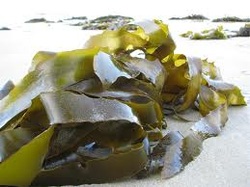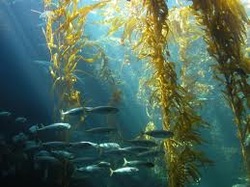
This farm is one of three trials in the inshore waters off the coasts of Norway, Scotland and Ireland, which are growing sugar kelp on textile mats suspended in the water. The experimental harvest will reveal which textile produces the best carpet of seaweed.
Some experts suggest that producing fuel from seaweed is too expensive to make it viable as a business, but the researchers say they could have commercial-scale farms within a decade. Selling the seaweed for other purposes, as a food or a cosmetic ingredient for example, could increase the value of the crop.
There are many good recipes using seaweed but I've never seen it in a local supermarket—apart from Nori, the Japanese paper-thin wafer for use as a sushi wrap.
Scientists continue the hunt for energy sources that are safer, cleaner alternatives to fossil fuel. Recycled cooking oil is already collected for diesel. However, an ever-increasing amount of valuable farmland is being used to produce bioethanol, a source of transportation fuel. And while land-bound sources are renewable, economists and ecologists fear that diverting crops to produce fuel will limit food resources and drive up costs.
World hunger comes to mind. Why grow fuel when people need food?
The Tel Aviv University's Department of Zoology and the new Renewable Energy Center studied the seas for a renewable energy source that doesn't endanger natural habitats, biodiversity, or human food sources. Marine macroalgae—common seaweed—can be grown more quickly than land-based crops and harvested as fuel without sacrificing usable land.

This makes sense. Use a natural resource for a natural byproduct.
The researchers believe that producing biofuel from seaweed-based sources could even solve problems that already exist within the marine environment. Many coastal regions, including the Red Sea in the south of Israel, have suffered from pollution caused by human waste and fish farming, which leads to excessive amounts of nutrients and detrimental algae, ultimately harming endangered coral reefs.
Seaweed brings back happy memories of youth for me—swimming in churning surf, jumping over drifts cast up on the sand, and the distinctive smell which we associate with the coastline.

 RSS Feed
RSS Feed






